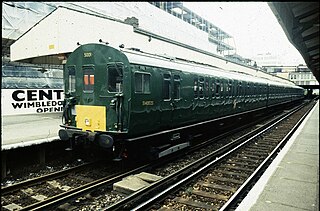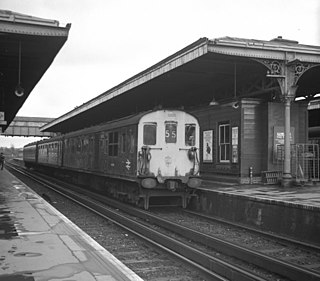Other uses
- EPB, class designation for rail coaches used by Reading electric multiple units on its Philadelphia, US commuter rail lines
EPB is an American electric power distribution and telecommunications company.
EPB may also refer to:

The Ejército Popular Boricua, also known as Los Macheteros, is a clandestine militant and insurgent organization based in Puerto Rico, with cells in the broader US and other nations. It campaigns for, and supports, the independence of Puerto Rico from the United States.

The British Rail Class 73 is a British electro-diesel locomotive. The type is unusual in that it can operate from the Southern Region's 650/750 V DC third-rail or an on-board diesel engine to allow it to operate on non-electrified routes. This makes it very versatile, although the diesel engine produces less power than is available from the third-rail supply so the locomotives are rarely operated outside of the former Southern Region of British Rail. It is one of the first bi-mode locomotives ever built. Following the withdrawal and scrapping of the more powerful Class 74 bi-mode locomotives in 1977, the Class 73 was unique on the British railway network until the introduction of the Class 88 bi-mode locomotives in 2017. Ten locomotives have been scrapped.
The Southern Railway (SR) gave the designation 2-NOL to the electric multiple units built during the 1930s from old London and South Western Railway carriage bodies on new underframes. None of these units survived long enough in British Rail ownership to be allocated a TOPS class.

Jamalpur is a district in Bangladesh, part of the Mymensingh Division. It was established in 1978.

British Rail Class 416 (2-EPB) was a class of third-rail electric multiple units in service between 1953 and 1995. They were intended for inner suburban passenger services on London's Southern Electric network. There were two subclasses of Class 416: Class 416/1 to an SR design on salvaged 2-NOL underframes, built between 1953 and 1956, and Class 416/2 based on a British Railways Mark 1 coach design.

The Honda CG125 or Honda CG is a commuter motorcycle made by Honda of Japan. It was in production from 1976 to 2008 in Japan and has been in production since 1992 in Pakistan. The CG was originally manufactured in Japan, but the source for the European market was eventually moved to Brazil in 1985, and to Pakistan and Turkey in 1992 for the W and M models. The CG125 is powered by a 124 cc (7.6 cu in) four-stroke, overhead valve, single-cylinder engine that has changed little over the years.

The British Rail Class 501 electric multiple units were built in 1955/56 for use on the former LNWR/LMS suburban electric network of the London Midland Region. A total of 57 three-car units were built.

The Textile Institute of Pakistan (TIP) (Urdu: دانشکدہَ علومِ بافتنی پاکستان) is a private institute in Karachi, Sindh, Pakistan. The Institute was established by the All Pakistan Textile Mills Association (APTMA) in 1994 to create textile professionals to support Pakistan's textile industry. Textile Institute of Pakistan is one of the best art and design institutes in the country.

The British RailClass 414 were two-car electric multiple units that were built between 1956 and 1963. They were withdrawn in 1995.

The British Rail Class 415 was a suburban 750 V DC third rail electric multiple unit commissioned by the Southern Region of British Railways. Built between 1951 and 1957, it became the most numerous class on the region after the withdrawal of the 4SUBs. The final trains were withdrawn in the 1990s, replaced by Class 455, 456, 465 and 466.

The Tyneside Electrics were the suburban railways on Tyneside that the North Eastern Railway and the London and North Eastern Railway electrified using the third rail system. The North Tyneside Loop was electrified from 1904 onwards and formed one of the earliest suburban electric networks; the South Tyneside line to South Shields via Pelaw was electrified in March 1938. British Railways converted these lines to diesel operation in the 1960s: the line to South Shields in January 1963 and the North Tyneside lines in June 1967 when the electrical supply infrastructure and the rolling stock had become life expired. In addition, the system was losing passengers and suffering from costly vandalism. Since the late 1970s, much of the system has been converted to form the Tyne and Wear Metro.
The Puerto Rican Workers' Revolutionary Party is a far-left political party in Puerto Rico.

The British Rail Class 206 or 3R was a type of Diesel-electric multiple unit (DEMU), introduced in 1964. They were not 'built' as such but rather re-formed from Class 201 and EPB vehicles for use on Reading-Redhill-Tonbridge services. Six three-car sets were created, numbered 1201-1206.

Brake-by-wire technology in the automotive industry is the ability to control brakes through electronic means, without a mechanical connection that transfers force to the physical braking system from a driver input apparatus such as a pedal or lever.
The electro-pneumatic brake system on British mainline railway trains was introduced in 1950 and remains the primary braking system for multiple units in service today, although London Transport underground trains had been fitted with EP brakes since the 1920s. The Southern Region of British Railways operated a self-contained fleet of electric multiple units for suburban and middle-distance passenger trains. From 1950, an expansion of the fleet was undertaken and the new build adopted a braking system that was novel in the UK, the electro-pneumatic brake in which compressed air brake operation was controlled electrically by the driver. This was a considerable and successful technical advance, enabling a quicker and more sensitive response to the driver's operation of brake controls.
The Ministry of Commerce ; abbreviated as MoCom), is a Cabinet-level ministry of the Government of Pakistan concerned with economic growth and commerce development and promotion in Pakistan. The administrative head of the ministry is the Commerce Secretary of Pakistan, presently Muhammad Sualeh Ahmad Faruqi. The political head, Minister of Commerce, is required to be the member of Parliament.

An electronic parking brake (EPB), also known as an electric parking brake or electric park brake, is an electronically controlled parking brake, whereby the driver activates the holding mechanism with a button and the brake pads are electrically applied to the rear wheels. This is accomplished by an electronic control unit (ECU) and an actuator mechanism. There are two mechanisms that are currently in production, Cable puller systems and Caliper integrated systems. EPB systems can be considered a subset of Brake-by-wire technology.

The Taiwan Railway EMU100 series was a set of rail cars fabricated by British Rail Engineering Limited and the General Electric Company in 1976 that has operated in Taiwan. The alternating current electric multiple unit (EMU) fleet entered full squadron service in 1979, and was withdrawn from service in 2009. This class of railcars were the first to operate on the electric Tzu-Chiang Express. Due to the unit's British origin, rail buffs have variously nicknamed them "British Girl", "British Lady", or "British Grandma".
Export Promotion Bureau (EPB) is a Bangladesh government agency located within the Ministry of Commerce. It is responsible for developing the nation's export industry. It does not include import data

Metropolitan Chamber of Commerce and Industry, Dhaka (MCCI), established in 1904, is the oldest trade organization of Bangladesh.